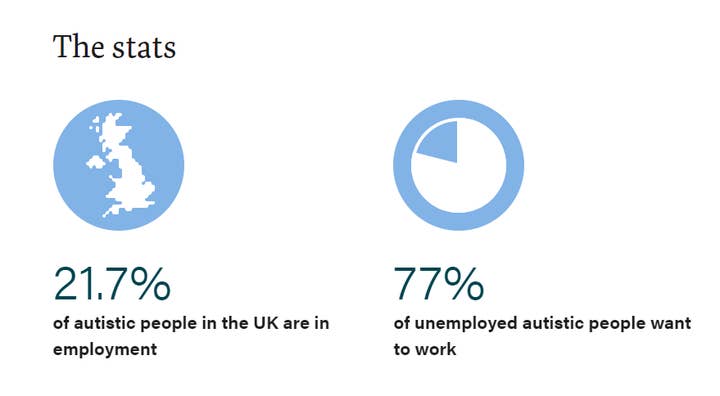Understanding and supporting neurodiversity in the workplace
The GamesIndustry.biz Academy looks into neurodiversity and how companies can better support and empower their staff
While awareness of neurodiversity conditions such as ADHD and autism has been rising in recent years, the needs of neurodivergent people in the workplace are still widely misunderstood.
Neurodiversity is a term coined in the late '90s and typically used to refer to neurodevelopmental diagnoses such as autism, ADHD and learning disabilities that are thought of as present from birth, as opposed to mental health issues such as depression or anxiety, which typically manifest later in life.
Raffael Boccamazzo, doctor of clinical psychology, clinical director at mental health advocacy organisation Take This, and autistic himself, describes it as "being on a different operating system" from the rest of the world, while "other diagnoses like depression and anxiety might be thought of as malware."
Taking the operating system metaphor a bit further, Boccamazzo says that autism is like running Linux in a Windows world.
"In terms of comorbidities, I usually say diagnoses are like tattoos: you never just get one"
Anna Brandberg, King
"I will never be a Windows computer, but I'm expected to interface, because I'm outnumbered 50 to one, by some estimates. And so I'm forced to try to speak Windows in order to function in a world that sees me as a broken version of normal instead of simply operating differently."
But mental health issues and neurodiversity conditions are also often interlinked.
"In terms of comorbidities, I usually say diagnoses are like tattoos: you never just get one," says Anna Brandberg, senior UX designer at King, who was diagnosed with ADHD at the age of 32, after years of "struggling on [her] own without knowing why."
Boccamazzo adds that he "can't think of a single soul who has a diagnosis of autism, ADHD or learning disability, who only has a diagnosis of autism, ADHD or learning disability."
"All of us are anxious as hell, pretty much all of us struggle with chronic depression as well, largely due to the fact that we've been told we're a broken version of normal our entire lives," he continues.
In this article, we'll be mainly focusing on autism and ADHD, and how companies can better accommodate these conditions in the workplace. For people in need of guidance about mental illnesses, the GamesIndustry.biz Academy also has a guide about how to approach mental health in the workplace.
"All of us are anxious [or] struggle with chronic depression, largely due to the fact that we've been told we're a broken version of normal our entire lives"
Raffael Boccamazzo, Take This
But before getting into details, there are two resources that have been highly recommended by our interviewees. Jake Mackey, games partnerships manager at UK charity Autistica, points to the Reasonable Adjustments Toolkit created as part of an employment research project called DARE, led by Autistica and University College London. It's a list of possible adjustments that employers can make, and "a great way to review existing working practices and to facilitate conversations between staff and managers," he says.
Boccamazzo also invites people to browse askjan.org, which covers possible accommodations by diagnosis but also, if you don't know the diagnosis, by work problems.
We also have gathered a list of resources that you can download on this page.

It all starts with conversations and education
Neurodivergent people routinely face ableism throughout their lives, making it difficult for some of them to disclose their issues in the workplace.
"There is a stereotype that autistic people have difficulty maintaining relationships," says freelance creative director and narrative designer Matty Alexander, who has an autism spectrum disorder diagnosis. "This is because we were exposed to a great deal of mistreatment, and ridiculed during our formative years without proper support. So our idea of healthy behaviour becomes distorted resulting in a high tolerance for abuse. When combined with the whole 'constantly coming from a place of good faith and trusting people,' we are at higher risk than [neurotypicals] of accepting unhealthy behaviour."
"Our idea of healthy behaviour becomes distorted resulting in a high tolerance for abuse"
Matty Alexander
Everyone we talked to for this article has expressed very high levels of stress and fatigue leading to burnouts and/or panic attacks when working at companies not catering for their needs, either before their diagnosis or simply because they feared sharing their issues in the workplace would have a negative effect.
Priscilla Snow, now a freelance composer and sound designer who has worked on titles such as A Good Snowman is Hard to Build and Jett: The Far Shore, didn't say anything about the obstacles they would encounter for a long time, when working as a contractor.
"I didn't tell anyone at the studio because I was afraid if I said anything that I would suddenly be put under a microscope. So I was very hesitant to say, 'Hey, I don't have a diagnosis yet, but I'm pretty sure I'm autistic and that can sometimes affect my day-to-day."
As a result, they set unrealistic expectations for themselves, leading to harsh self criticism and impostor syndrome.
"I kept this mask on, especially early on in my contract. I would be sitting at my desk, managing all this stuff and trying really hard to just do it right, do it fast. And I got to the point, months later, where I would find myself realising that I had been dissociating for five minutes, just staring at my computer screen. And then I would be paranoid that people were going to think I'm not doing my job. It started this cycle of overcompensating and paranoia.
"It is up to HR and management to create an open and supportive environment where these conversations can happen"
Jake Mackey, Autistica
"The entire time I would be at my desk, I'd be micromanaging myself. How am I sitting? What is my face doing? Are people going to think it's weird? And it just wears on you so badly. You try to pretend it's fine and it's normal, but it's just not."
It's the company's responsibility to establish a culture in which talking about neurodiversity conditions is welcome, and will not be held against employees or isolate them.
"It's important that HR teams take a fresh look at all of their traditional processes and understand the impact that these could have on neurodivergent job seekers and employees," Mackey says. "They may need to make significant changes if they are to be truly inclusive.
"Creating a culture that is inclusive can be more challenging, but it is vitally important. In our research just 15% of autistic staff felt comfortable requesting reasonable adjustments at work, so it is up to HR and management to create an open and supportive environment where these conversations can happen."

Boccamazzo notes an important factor to take into account when it comes to neurodiversity: most of the research on autism and ADHD is historically centered around cisgendered men, meaning its characteristics are commonly more recognisable in them than in cisgendered women or folks of any sort of gender diversity.
"A lot of times, people outside of that narrow band of cisgendered men are struggling more than others realise and they don't get spotted," he says. "And they're even hesitant to say anything for a variety of social reasons. The amount of folks struggling and flying under the radar is greater than people realise. The fact that people have to self-diagnose at this point is a reflection of a multitude of greater systemic issues. One is recognition, two is access to care."
"The fact that people have to self-diagnose at this point is a reflection of a multitude of greater systemic issues"
Raffael Boccamazzo, Take This
Which is why having open communication lines with employees is pivotal in making sure issues first don't go unnoticed, and second can be addressed and helped openly.
"There is a lack of communication about neurodiversity in the workplace and I think that's a two-fold thing," says Stephen Rooney, senior writer at Larian Studios, and diagnosed with inattentive-type ADHD in his 30s. "It's very difficult for neurodiverse people sometimes to put up their hand and say 'there's going to be days where I'm just a bit useless', and then expect their manager to be okay with that.
"And there's also an unawareness on the management side that these are even problems to begin with. So the biggest challenge in all of this is both sides communicating with each other on what's actually happening. There's a lot of good will from people to try and make accommodations where possible, but they do first need to understand that neurodivergence is a thing. That's the education that needs to be [done].
"I think it's very easy for people who are neurodivergent to feel that they're failing because they can't function normally or at the same level as everyone else in the workplace. So you can absolutely come up with a list of things to try, but the most important thing is going to be to communicate with the individual that you're dealing with and ask them: what is it that you need? What is it that is going to work best for you? And to do it in a non-confrontational way."
"The biggest challenge in all of this is both sides communicating with each other on what's actually happening."
Stephen Rooney, Larian
Mackey adds that helping non-autistic staff to understand more about neurodiversity is an important step. To that effect, Autistica has created a short film about how autistic people experience the world, and this animation about anxiety in autism.
Brandberg adds that the way you tell people about your condition has its importance.
"How you deliver that is always going to affect how people respond to you. It's almost a self-fulfilling prophecy. If you disclose it in a way that makes it seem like a bad thing, then people will worry too. But if you go: hey, so I just got diagnosed with ADHD and it's exciting to discover all this cool stuff about how my brain works, then people usually tend to respond with equal excitement and curiosity. My advice would be to read up about your diagnosis so that you know exactly how your symptoms manifest for you and how you can be supported."
Be mindful of how your office space is set up
The first step you can take to make your workplace more inclusive is adapting your office space.
Brandberg and Rooney explain that they can't sit in the middle of an open plan office because they get distracted by absolutely everything. Snow says they can get pretty sensitive to smells, sounds, and lights, resulting in ocular migraines.
"Here at King I requested that I be placed in a corner of the office," Brandberg says. "That way, when I put my headphones on, both visual and auditory distractions vanish and I can actually focus. Otherwise I get nothing done and it's only when everyone leaves at night [that] I'm able to focus, which unfortunately results in me ending up working lots of overtime instead."

When working at a studio, Snow wished there had been a room where they could turn the lights off.
"I wish there'd been a 'chill out room' that you can go to, that doesn't turn into people chatting," they continue. "If there had been something like that, a place where you just need to go sit for a bit, that would [have been] great. Because otherwise you're just at your desk under these fluorescent lights or with windows everywhere, and people around you talking. It's this weird feeling of hypervigilance constantly because of that kind of office setup."
With a lot of companies now implementing a hybrid model between working from home and office presence, it's a good time for managers and HR to rethink how they're approaching the workplace.
"The change of routine and uncertainty around the pandemic affected all of us," Mackey says. "But for many autistic people we know that the impact was even greater. Autistic people are four times more likely to have anxiety than non-autistic people and uncertainty is often a root cause.
"It's important for companies to recognise that things may get worse before they get better and to be kind to their employees as we figure out this new normal. We need to learn from what worked well over the past year and not rush back to our previous idea of work. We have a great opportunity to make the workplace more inclusive and we should embrace new ways of working."
"We need to learn from what worked well over the past year and not rush back to our previous idea of work"
Jake Mackey, Autistica
Boccamazzo adds that it's important to recognise that working from home is a "different skill set."
"A lot of neurodivergent folks need external structure," he continues. "Usually, in a more traditional workplace environment, that structure is externally generated. Companies [need to] help their employees to learn and generate some of that external structure, whether it's designated work hours or it's body doubling. Body doubling is a technique that's used especially within the ADHD community where you just sit together and you work silently. We actually do that at Take This, where our operations director and I will just be on a video call and we'll be working [alongside each other]."
Provide a structure that supports executive functioning
Looping back to that need for structure is one common trait found in autism, ADHD and learning disabilities: executive dysfunction. It affects a range of abilities, from being able to prioritise, get started and/or remember tasks, focus your attention, regulate your efforts, or shift from one task to the other.
Brandberg and Snow both mention that without an external structure to regulate their working day, they might forget to eat, drink, or take breaks.
"Executive functioning first and foremost has to do with regulation," Boccamazzo says. "There's a lot of people who think ADHD has just got a terrible name because it's not a lack of attention, it's a lack of ability to regulate the attention.
"Executive functioning first and foremost has to do with regulation"
Raffael Boccamazzo, Take This
"A metaphor I like to use is if you go to a party and there's 15 people around you, selectively focusing on one voice instead of letting it all come is a powerful ability that a lot of folks with ADHD -- and there's overlap with autism -- we don't have. While simultaneously being able to hyperfocus for eight hours and lose track of time on things in unpredictable fashion.
"But additionally, folks struggling with executive functioning challenges also have other difficulties like task management, strategising, mood regulation ability -- we tend to be a little impulsive. So all of this can manifest in the workplace in a myriad of possible ways and it's highly individualised. Maybe that comes in the form of interpersonal conflicts, maybe that comes in the form of not being able to generate structure for fairly open-ended projects, maybe that comes in the form of missing deadlines or focusing on priority five when really you want somebody to focus on priority one.
"In the case of autism, you're also looking at the possibilities of other, very specific forms of learning disabilities, whether it's agraphia (an inability to write), dyslexia, or dyscalculia (inability to do math)."
- Consider creating artificial deadlines
All our interviewees have expressed this need for a very clear structure, whether real or created artificially to help them keep on track.
"The overwhelming experience for me -- and often for the people that I work with -- is frustration because I will either be moving very quickly through something or almost not moving at all," Rooney says. "So obviously that's incredibly difficult because it means you can't reliably plan your output basically. What works best for me is a very clear structure. If I know someone is going to look at my dialogue lines at 4pm on a Thursday and that's going to happen every week, then I can manage my expectations for what that week is going to look like. And I can manage my panic. So a looming deadline can be very effective for me -- as long as I know that there's a clear structure that's communicated well and there's a regularity to it.
"I've found that creating that sense of pressure artificially can be difficult sometimes but when it works, it works really well. If I have drawn up a schedule, hand it to someone else and if they will reliably check in on [me], that can work fairly well."

Brandberg recommends breaking down big tasks into smaller chunks to artificially create deadlines along the way.
"Big tasks can be utterly debilitating sometimes, because we don't know where to begin, and then executive dysfunction kicks in, making it absolutely impossible to even get started," she says. "So a manager can help by breaking down big tasks, and placing soft deadlines on each smaller task. Because if you tell a person with ADHD that they have a massive task that they need to get done in a month's time, odds are they're not going to even start it until two days before it's due and then they'll stay up until 2am both nights to get it all done on time. We are literally time blind.
"So helping us break down small tasks and setting deadlines for them is good because it not only provides accountability, but it also creates urgency. Suddenly they will actually get the first step of the big task done right away, because they know they have a meeting with someone tomorrow, where they're expected to present it."
- Implement timeboxing to help with task switching
One way to cope with cognitive overload and context switching is timeboxing, which is essentially allocating time periods to tasks, such as meetings. Boccamazzo doesn't have meetings on Thursdays and Fridays, for instance.
Brandberg mentions the pandemic as a particularly bad time when it came to meetings and being able to work her way around them. Because of the tendency of the brain to hyperfocus for some neurodivergent folks, juggling multiple projects at once or switching from one task to the other in a short amount of time can be challenging.
"Suddenly all the conversations had to [happen during meetings] so I was on Zoom from 9 to 6 every day," Brandberg says. "And so at night was when I managed to get my deliverables done. Other people would have half an hour here and there, and they'd be able to get things done. But if you have issues with context switching and executive dysfunction, [you] can't do it.

"My advice would be to put all your meetings at the very beginning of the day. So instead of having meetings scattered throughout the day, I would get bigger chunks of three to four hours where I could actually get work done. Advice there for workplaces would also be to schedule 'no meeting' days."
Allowing neurodivergent staff to focus on one project at a time, as well as giving notice ahead of time when there's a big project that needs doing so they can prepare mentally, are both important steps to support your employees. It's also about giving staff some breathing room to "recalibrate," Snow explains.
"That was a constant source of frustration to me -- [being] given a task but then in the stand up meeting the next morning that became irrelevant within a matter of hours, so I had to change my whole expectations for what my day was," they say. "Those day-to-day things can cause a lot of frustration. I mentally prepared for this but now this is happening and I have to change gears.
"The same applies for readjusting expectations about things in projects -- when I have room to sit by myself for a moment and let myself be disappointed or confused, let myself re-calibrate, then I can come back to the table with a clear head, and usually even with a plan for whatever it is that is the problem. I'm a very good problem solver, if I can be given that time to just chew through things on my own for a bit."
I'm a very good problem solver, if I can be given that time to just chew through things on my own for a bit"
Priscilla Snow
Another way to prevent or help with cognitive overload is taking the time to give essential pieces of information before delving into in-depth specifics of a project or presentation.
"When giving them a complex task or large amounts of information, make sure that you give them just the basics at first," Brandberg says. "Start with the absolute need-to-know information, and once they've got that down, you can then flesh it out and provide all the rest of the information.
"If, for example, you have a big, complex presentation planned, try to include a super brief summary with two to three of the main points in the email invitation that people can read in advance. If you can, take five minutes to brief your ADHD team member directly. This allows people with cognitive disabilities to get the basic gist and start processing beforehand. It helps with both context switching and cognitive overload, so when you start the meeting they're able to actually absorb all the information and know what's required of them. In your presentation itself, a good habit is to always make sure you include a clear overview as part of the intro before you deep-dive into details. 'Today we'll be covering X then Y then Z.' And, frankly, even neurotypical people will appreciate having their cognitive overload reduced.
"I [also] literally don't have a properly functioning working memory, so make sure that any tasks you'd like me to do are given to me in writing. That's a big one -- one of my coping mechanisms is writing reminders for absolutely everything."
- Implement a feedback system that takes RSD into account
Rejection sensitivity dysphoria (RSD) is a trait characterised by low self-esteem, setting impossibly high standards for yourself and feeling like you've let people down if you don't hit these expectations. It also triggers a difficulty to handle the emotions that come with some forms of criticism, alongside an intense feeling of rejection.
It's a common characteristic found in a range of neurodiversity conditions, including ADHD.
"HR is responsible for educating people in management positions about what neurodiversity is," Brandberg says. "Make sure managers have personal development plans in place for their direct reports with ADHD. And they can include things like: how do you prefer to get feedback? Because we often struggle with RSD, which can be debilitating. If someone provides me with difficult feedback in a manner that they know works for me, I won't get as upset about it and will be far more receptive.
"HR is responsible for educating people in management positions about what neurodiversity is"
Anna Brandberg
"But also things like if you want to be given bad news at any point during the coming year. Do you want to get a heads up in writing first? Do you want to be told face-to-face in a meeting? Anything could make someone upset, how do you want to receive that?"
One of our interviewees mentioned that they'd been criticised in a previous company for their "poor time management," for struggling to prioritise and for "being a perfectionist." Phrasing criticism in such a harsh way is unlikely to give any results. Focus on the desired result, not what you perceive as an issue.
"If someone in a company sees that someone is not hitting deadlines, is not doing the thing that's expected of them, it's very important not to rock up and be: Why are you so lazy? Why are you so impatient? Why do you have this bad trait? And just to ask: Hey I've seen that this and this has happened, or not happened, what's going on? Can we talk about it? Is there anything we can do to help?" Rooney explains.
- Be mindful of your communication pipelines
While you may have set means of communication within your company, adapting and updating them so they match your staff's needs is a step who might need to consider.
"Autistic people may struggle with the traditional way that we might communicate at work," Mackey says. "They may need time to process information and may find it difficult to read unspoken body language. Adapting the way you communicate can make communication clearer and easier for everyone."
Alexander mentions issues he's encountered during his curriculum, where he's had to do a presentation virtually.

"I had brain fog on brain fog, and I was put into a situation that I wasn't ready for -- you put me in front of people, I will crush it. You put me in a situation where I'm behind a screen and I can't see people's faces or read their expressions, then it's a recipe for disaster," he says.
Boccamazzo adds that it's also important to be willing to offer asynchronous options for communication.
"For a lot of us, especially with autism, asynchronous forms of communication where we're not face-to-face, where we have a second to think about how to [answer] -- often text or DMs -- are easier.
"Make employees less accessible. My biggest challenge is how interconnected we are and so if somebody wants something for me, they ping me on Slack and then I get the notification and suddenly I'm distracted from what I was doing. So supporting the idea that not every need is urgent is another thing."
- Make sure you offer flexible options
Many of the adjustments mentioned come down to one thing: provide flexibility, as there is no one size fits all solution.
"There are a number of challenges that autistic people can face in the workplace, yet we know that with some simple adaptations they can bring great diversity of thought to the industry," Mackey says. "Being autistic can affect the way that you interact with the world and other people. Autistic people may have different sensory needs. Giving staff the flexibility to control their environment -- by working from home, wearing headphones or sitting in certain places within the office can make a huge difference."
Rooney adds: "I know people who work very well if they can move around the office and if they have a sense of freedom where they can just pick up [their] laptop, go to the canteen, go sit outside on a bench. And I know other people [who use] the Pomodoro Technique -- so work 25 minutes or 15 minutes, then take a small break."
Snow mentions that they would love to work in a studio environment again one day. But it would need to provide that type of flexibility.
"I love to be in a room full of people who are excited about something, but I know now that it has to be a specific kind of environment"
Priscilla Snow
"There were good days, where I loved what I was doing and I loved working with other people -- and that's part of what's really frustrating for me about working in games. I love to collaborate. I love to be in a room full of people who are excited about something, but I know now that it has to be a specific kind of environment, and it has to be an environment that understands that I might be able to work [really well] one day, but the next day I might be way better off if I can work from home.
"Because there's just some days where the biggest struggle would just be getting myself to work. I kid sometimes that getting myself to an office that's two or three bus changes away, or even just meeting up with a friend to carpool, feels like trying to walk into Mordor. It feels unreasonably difficult. And some days it's totally fine. A lot of people would benefit from that kind of flexibility -- a 'no questions policy' if you can't come into the office for whatever reason. You never know what's going to set off this [internal panic loop]."
How to approach the recruitment process
Being more inclusive also means tweaking how you approach recruitment, which can be a highly stressful process for neurodivergent people. Alexander initially mentioned his ASD diagnosis on his CV for the sake of being transparent but has not resorted to removing it.
He points to a lack of understanding from most companies when it comes to adapting the recruitment process, in particular the interview.
"Since I've removed that part of myself, I've been getting more interviews," he says. "But as soon as I get to the interview stage, it's like the demeanour completely changes. There's things that you can do, like you can let [candidates] take notes, you can give them the interview questions beforehand. I don't know why we live in a society that treats interviews like exams. No matter whether you're neurodivergent or you're neurotypical, you have to think on your feet and it's not a comfortable environment for people to do that.

"After I pointed out to a company what I needed due to my ASD, it wasn't important to them. I stated my needs, and they didn't think that I was important enough for a response. If somebody in a wheelchair asks you to hold the door open for them, do you take two minutes out of your day or do you just flip them off and go about your day? Why, because my illness is invisible, do I receive different treatment? Why is my disability less valid?"
Mackey highlights the importance of companies starting their inclusivity journey from their very first interactions with employees at the recruitment stage.
"Simple adjustments such as pre-interview guides and providing interview questions up front can help make the process a lot more inclusive. Then when employees start, give them a comprehensive guide to the business -- not just the policies and procedures, but the unwritten things, like what happens at lunchtime, who makes the tea, what happens on people's birthdays. All of these things can remove the element of uncertainty that can worsen any new job anxieties.
"A lot of the adjustments are simple to do and actually benefit all your staff -- autistic or not. If the pandemic has taught us anything, it's that we all work differently. We should embrace that difference to find the best ways to help everyone to be productive and happy at work."
Mackey mentions that "culture fit" is a wide term, and is keen to remind companies that they should look more broadly at a person's values and beliefs rather than judging them on how they may interact in an interview.
"Skills-based interviews may allow for this to show through rather than traditional face-to face conversations which autistic people may find more challenging," he says. "Companies shouldn't be looking for people that can live and breathe a company culture, but who behave and think differently. This diversity is a good thing. It leads to innovation and change. It helps companies strive to do better. The industry shouldn't be looking for people that fit the mould or they won't see progress."
"When interviewing, be clear about what will happen and when, and who will be involved, and don't change the process"
Jake Mackey, Autistica
When it comes to the process itself, Mackey adds that clarity of communication is the key element.
"Make the job description clear -- really think about the day-to-day expectations of the role," he continues. "And when interviewing, be clear about what will happen and when, and who will be involved, and don't change the process.
"Removing any elements of uncertainty makes for a better recruitment process for everyone. Really think through the way you are screening candidates for the role. Does a traditional face-to-face interview match the role you are hiring for -- or would a skill-based assessment give you a better idea of their ability to do the job? If the interview is face-to-face, share questions in advance, only ask one question at a time, and be explicit about how you would like that question to be answered."
Another thing that you can put in place for people with processing speed issues, learning disabilities, autism or ADHD is relying more on work samples.
"The research on [job interviews] show that they are not that indicative of the quality of work a person is going to do," Boccamazzo says. "All that in-person interviews really do, especially when they're spontaneous, is give us an idea that somebody can be charming or personable in spontaneous interpersonal situations. And for some positions that's valuable. But for somebody who's going to be behind the scenes, give them tasks, give them tests that actually indicate their job performance."
When it comes to tests, make sure to be clear about your expectations, what you'll be judging, and how much time should be dedicated to it.

"If you're going to ask someone to do a test for a role, let your candidates know that you are looking for their way of working and not necessarily the final results," Brandberg says. "Let them know that they're only meant to put eight hours or four hours into this test. Because if I think that the deliverable is the important part and I haven't been told that it's the process, for example, then I will work 40 hours to make sure that my deliverable is flawless."
Another potential source of anxiety and distress is not knowing when you might hear back from a recruiter, or simply not being told that you didn't get the job.
"It's very important to give people time frames and then to stick to those time frames," Rooney says. "'We're going to let you know if you got it or not in a few weeks' -- it doesn't matter how long the time is as long as the person knows when it's actually going to arrive.
"A lot of neurodivergent people get very anxious and very wound up when they're waiting for something and that thing does not arrive, and they have no idea. Just let people know what to expect, or [they] just spend a month constantly checking [their] email. It fucks with you."
Take a strength-based approach
One of the most important things you need to remember about neurodiversity is that it will also add strength to your team.
"It's very much a blessing and a curse," Rooney says. "Sometimes it lets me hyperfocus, which is fantastic. But it's still really tough and leads to a lot of burnout. But it's great in the sense that it gives me a lot of creativity, a lot of ability to approach things from a different angle.
"It takes empathy and it takes an open mind and an open heart to hear what people have to say and foster these trusting relationships"
Stephen Rooney, Larian
"There's a bunch of really really good benefits to having neurodivergent people in the team. They'll be able to solve problems differently, and you will get people who work in wonderfully creative ways and I think that's one of the important things. It takes patience, it takes empathy and it takes an open mind and an open heart to hear what people have to say and to encourage people to tell you what you need to hear, and foster these trusting relationships.
"Again it's not just down to management to fix a lot of this stuff, it's our responsibility as well to communicate these things. And we always do that best when it's a safe environment, and I think creating that safe environment is very important; it's one of the most important things that people can do."
Brandberg adds that companies need to ensure neurodivergent people are placed in roles where they will succeed.
"If you have someone that clearly isn't good at routine mundane tasks, don't put them in that position," she says. "If you've got someone who's really good at brainstorming and starting new projects, pair them with people who are good at completing them. It's not just about placing the ADHD person in a specific role, but also who you put them in a group with. Make sure that your team dynamic has a balance of different kinds of people."
"If I could wish only one thing from employers really, it's to get this binary concept of good or bad worker out of their head"Raffael Boccamazzo, Take This
Boccamazzo likes to train people about that specific aspect by using a Dungeons & Dragons metaphor.
"If you play Dungeons & Dragons, or really any role-playing game, there is no character that you can play that is good or bad. They all have different stats. And so there are definitely some scenarios where one character is more specialised and effective, and others are not. Like you don't send your wizards to the frontline, especially at level one, where a house cat is going to take them down. But instead you recognise what their individual strengths are and put them in situations where you're going to maximise those benefits and help them feel empowered. It's the same thing with your employees.
"I would hope that employers start viewing their employees like an adventuring party in a role-playing game, with individual strengths and weaknesses. And learn to capitalise on that. If I could wish only one thing from employers really, it's to get this binary concept of good or bad worker out of their head."
More GamesIndustry.biz Academy guides to Working in Games
Our guides to working in games cover various perspectives, from hiring to retention, to landing the job of your dream or creating the right company culture:








